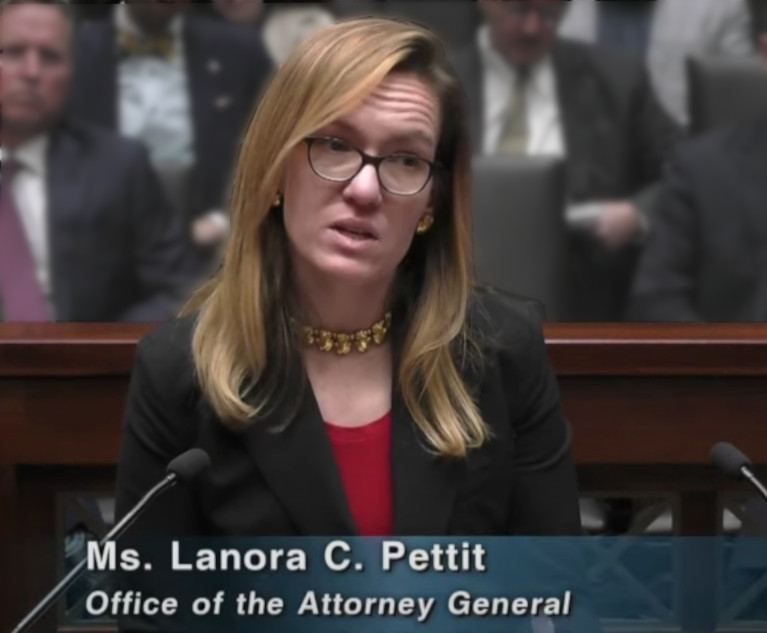Texas Plaintiffs Benefit from Democratic Judicial Sweep, New Study Shows
"I think the study does show that political affiliation does make a difference," said Haynes and Boone partner Kent Rutter.
September 24, 2019 at 03:03 PM
4 minute read
 Photo: Shutterstock.com
Photo: Shutterstock.com
Many Texas judges say the "R" or "D" after their names do not impact their rulings on the bench.
But a new study shows that when Democrats swept appellate benches in the Lone Star State's major metro areas, there was a huge impact on civil rulings—which helped plaintiffs.
The study comes just as the state is launching a new commission to study nonpartisan methods of judicial selection in Texas. However, similar pushes in the past to put partisanship aside in judicial elections have failed.
 Haynes and Boone partner Kent Rutter
Haynes and Boone partner Kent Rutter"We were surprised by how dramatic the difference was in consumer cases after the new Democratic judges took the bench," said Haynes and Boone partner Kent Rutter, who conducted the study with Haynes and Boone associate Natasha Breaux. "The 2018 elections brought the Houston, Dallas and Austin courts in line with the trend we are seeing statewide: The courts of appeal are showing much greater deference to jury verdicts, and plaintiffs naturally benefit from that trend."
Many appeals come up from trial court cases in which plaintiffs won a judgment, he explained, which means that appellate rulings that uphold jury verdicts often benefit those plaintiffs.
Rutter and Breaux, both from Houston, studied civil rulings by the state's 14 intermediate appellate courts between September 2018 and August 2019, and released findings Monday in a presentation, "Reasons for Reversal in the Texas Courts of Appeals."
"I think the study does show that political affiliation does make a difference," Rutter said.
Consider rulings in tort and consumer protection cases: From September to December 2018, when the Houston, Dallas and Austin appellate courts were still all-Republican, appellate rulings reversed plaintiffs' trial court wins 39% of the time, while the courts only reversed defendants' victories 5% of the time.
When Republicans were swept out of those courts in the November 2018 election, and Democrats replaced them in January 2019, reversal rates in tort and consumer protection cases changed drastically. From January to August, the appellate courts reversed plaintiffs' victories 17% of the time and reversed defendants' wins 18% of the time.
Read the full report
Rutter noted the numbers are unable to reveal to what extent partisanship affected decisions, and there are other factors that could have impacted outcomes.
"One explanation for the shift could be that the departing judges were clearing the most difficult cases from their dockets in the final months of 2018," Rutter noted. "It may be premature to draw long term conclusions from the new justices' first eight months on the bench."
 Haynes and Boone associate Natasha Breaux of Houston
Haynes and Boone associate Natasha Breaux of HoustonBreaux added that partisanship aside, some of the statistical change may be attributed to the fact that these justices were brand new.
"In general, new judges are more likely to be deferential to trial court rulings. No new judge, however experienced, can have experience with all the different types of cases that the courts of appeal see," Breaux said.
Another finding from the study may surprise trial lawyers, she said, noting that she's heard litigators complain about how juries are selected, what evidence was allowed or barred, or how juries resolved conflicting testimony.
"The courts of appeal don't reverse jury verdicts for the reasons that they expect, Breaux explained. "When the courts of appeal do reverse after a jury trial, about two-thirds of the time, it's because the case never should have gone to the jury in the first place."
View the presentation:
This content has been archived. It is available through our partners, LexisNexis® and Bloomberg Law.
To view this content, please continue to their sites.
Not a Lexis Subscriber?
Subscribe Now
Not a Bloomberg Law Subscriber?
Subscribe Now
NOT FOR REPRINT
© 2025 ALM Global, LLC, All Rights Reserved. Request academic re-use from www.copyright.com. All other uses, submit a request to [email protected]. For more information visit Asset & Logo Licensing.
You Might Like
View All


Trending Stories
Who Got The Work
J. Brugh Lower of Gibbons has entered an appearance for industrial equipment supplier Devco Corporation in a pending trademark infringement lawsuit. The suit, accusing the defendant of selling knock-off Graco products, was filed Dec. 18 in New Jersey District Court by Rivkin Radler on behalf of Graco Inc. and Graco Minnesota. The case, assigned to U.S. District Judge Zahid N. Quraishi, is 3:24-cv-11294, Graco Inc. et al v. Devco Corporation.
Who Got The Work
Rebecca Maller-Stein and Kent A. Yalowitz of Arnold & Porter Kaye Scholer have entered their appearances for Hanaco Venture Capital and its executives, Lior Prosor and David Frankel, in a pending securities lawsuit. The action, filed on Dec. 24 in New York Southern District Court by Zell, Aron & Co. on behalf of Goldeneye Advisors, accuses the defendants of negligently and fraudulently managing the plaintiff's $1 million investment. The case, assigned to U.S. District Judge Vernon S. Broderick, is 1:24-cv-09918, Goldeneye Advisors, LLC v. Hanaco Venture Capital, Ltd. et al.
Who Got The Work
Attorneys from A&O Shearman has stepped in as defense counsel for Toronto-Dominion Bank and other defendants in a pending securities class action. The suit, filed Dec. 11 in New York Southern District Court by Bleichmar Fonti & Auld, accuses the defendants of concealing the bank's 'pervasive' deficiencies in regards to its compliance with the Bank Secrecy Act and the quality of its anti-money laundering controls. The case, assigned to U.S. District Judge Arun Subramanian, is 1:24-cv-09445, Gonzalez v. The Toronto-Dominion Bank et al.
Who Got The Work
Crown Castle International, a Pennsylvania company providing shared communications infrastructure, has turned to Luke D. Wolf of Gordon Rees Scully Mansukhani to fend off a pending breach-of-contract lawsuit. The court action, filed Nov. 25 in Michigan Eastern District Court by Hooper Hathaway PC on behalf of The Town Residences LLC, accuses Crown Castle of failing to transfer approximately $30,000 in utility payments from T-Mobile in breach of a roof-top lease and assignment agreement. The case, assigned to U.S. District Judge Susan K. Declercq, is 2:24-cv-13131, The Town Residences LLC v. T-Mobile US, Inc. et al.
Who Got The Work
Wilfred P. Coronato and Daniel M. Schwartz of McCarter & English have stepped in as defense counsel to Electrolux Home Products Inc. in a pending product liability lawsuit. The court action, filed Nov. 26 in New York Eastern District Court by Poulos Lopiccolo PC and Nagel Rice LLP on behalf of David Stern, alleges that the defendant's refrigerators’ drawers and shelving repeatedly break and fall apart within months after purchase. The case, assigned to U.S. District Judge Joan M. Azrack, is 2:24-cv-08204, Stern v. Electrolux Home Products, Inc.
Featured Firms
Law Offices of Gary Martin Hays & Associates, P.C.
(470) 294-1674
Law Offices of Mark E. Salomone
(857) 444-6468
Smith & Hassler
(713) 739-1250







